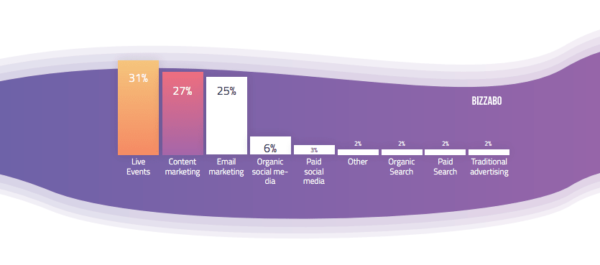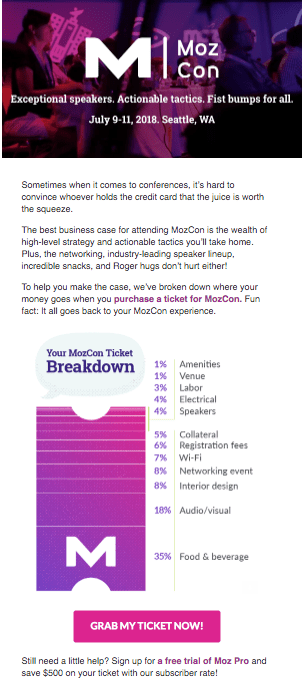In today’s busy digital world full of marketing options, it can be tough to figure out which strategy is right for you. Interestingly, offline marketing, particularly event marketing, has become a key part of the plans for many companies looking to build strong relationships with their customers.
According to the The 2018 Event Marketing Report that surveyed nearly 500 senior marketers, the majority believe that live events comprise the single most effective marketing channel for achieving business goals.

The majority of event marketers (63%) plan on investing more in live events, both in budget and number of events. In terms of event technology, 86% believe that technology can have a major positive impact on the success of their events. All signs indicate that event marketing is a long-term strategy for many brands and will continue to be so into the foreseeable future.
Executing a successful live event consists of many components, but there are a few fundamental pieces that are common across events. Here are five best practices for any event marketing campaign:
1) Determine Your Event Goals
The first step in an event marketing campaign is establishing your objectives and how you will measure success. These are four common event goals and a sample KPI that can be used to track success:
– Build the Sales Pipeline: Live events present a great opportunity for meeting prospects, nurturing them, and even closing deals. (Sample KPI: Time to close sales cycle)
– Amplify Brand Awareness: By attracting the attention of prospects, sponsors, and press, an event can amplify your brand in ways that other marketing channels cannot. (Sample KPI: Social Media mentions)
– Drive Event Revenue: Maximizing registrations and increasing the bottom line are common goals for most large scale events. (Sample KPI: Total registrations)
– Drive Partner ROI: Measuring audience engagement and offering leads to your partners are good ways to drive their ROI. (Sample KPI: Audience engagement with sponsors)
2) Assemble Your Event Technology Stack
Once you’ve established your event goals, the next step is to choose the right technology to help you get the job done. The most successful organizations are investing in CRMs, marketing automation software and event management software for their events strategy. Separately, these platforms may get the job done but when integrated into an all-in-one solution, this can help draw deeper insights.
To get more out of your event strategy, you will want to invest in other behind-the-scenes tech tools. A link management platform like Bitly, for example, tracks all of your links, standardizes UTM parameters, and organizes them by campaign in order to measure your promotional efforts as well as overall attendee engagement and analysis.
3) Unify Your Event Branding
From your event website to your event emails to your event branded links, you’re going to want to create a unified brand. When selecting software for your event technology stack, make sure that these tools provide the ability to feature your brand front and center.
MozCon, the annual conference run by Moz, does an exceptional job of keeping a unified aesthetic when it comes to marketing their event. You can see that both their email and website have similar visual language.
Another important touchpoint to keep on-brand is the URL. Having all event links reflect the brand provides a consistent and unified user experience. For example, the Webby Awards used Bitly to generate and track the wbby.co/vote to measure vote counts. Using a branded URL as opposed to a generic link helps to maintain brand integrity.
4) Partner Up
Partners can be an invaluable asset in your event marketing campaign. There are plenty of benefits that come along with an event partnership. These benefits include:
– Offsetting the cost of the event
– Bringing in additional event registrations
– Providing great speakers and other event content
– Educating your customers in how your organization can work in conjunction with other organizations
In order to find the right partner to team up with, rearticulate the event goals and think of ways in which a partner can help to achieve those goals while hitting their own KPIs. Defining the value proposition for both your company and the potential partner is a good way to start attracting the right people. Tap into your industry for connections and consider organizations that you’ve worked with in the past.
5) Measure Everything
Regardless of your event goals, it’s worthwhile to have data on everything and analyze later. Be diligent and consistent with your data collecting methods as the post-analysis process will be much smoother if all relevant data sets are organized in the same way. Some important metrics to track include are:
– Registrations by Ticket Type: Knowing which types of tickets were most/least popular will help with creating the pricing strategy for next year.
– Event Community Engagement Rate: Being able to prove high engagement levels within the event community on the event app will be something that sponsors and stakeholders want to see.
– Attendee NPS: At the end of the day, the event is for the attendees. Send out NPS (Net Promoter Score) surveys after the event to accurately measure their satisfaction levels
– Customers Acquired: Knowing how many customers were closed as a result of their attendance at your event is a meaningful indicator of ROI that you’ll want to use for future event strategy.
– Clicks by Channel: With all the different channels you’ll be using to promote the event, you’ll want to know which ones worked best. Platforms like Bitly make it easy to gain insight into which campaigns resulted in the highest CTR.
Crafting Your Event Marketing Plan
Embarking on the road to event marketing success may be unfamiliar to some, but the best practices surrounding this strategy are not very different from other channels. To set yourself up for success:
– Set specific event goals to help direct your event strategy
– Find an event technology provider that helps you better manage, market, and measure your events
– Hone your event brand and use it to drive awareness
– Leverage partners to help produce and promote your event
– Review data from your event to make it even better next time
At the end of the day, the most successful marketing campaigns are those that are able to muster the resources and focus to put the attendee experience front-and-center.
Read more:
